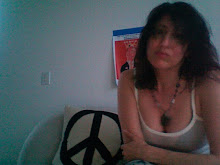Sunday, July 20, 2008
Making Up Rules by Clayton Patterson
Dear Readers: Clayton Patterson, one of the most famous street photographers documetating our history as it has unfolded since the late 1970's was arrested Thursday for doing what he does...I posted the link to photos of the arrest and here is a piece Clayton wrote so please read his thoughts which are interesting and timely.
Making Up Rules.
by Clayton Patterson
There is more than one kind of street photography and all street photographs should have rights. There is a difference between press and history. Press is about immediacy- history is the long term over view. I do both, as well as, a community service and the photographs have been useful in many ways to many people. I along with Elsa Rensaa, have amassed the largest archives of photographs ever taken by a single individual of the LES. The photos have changed history and added to it. The archives are wide ranging, as diverse as the community. They are an unrecognized national treasure. Then there are the books. The next book, which may be 3 books, is probably the largest peoples history ever published on the LES. The series is growing and a substantial historical set of documents- a People's History. Then there is the movie Capture, a documentary about the archives by Ben.vs.Dan Blowback productions. What are our rights to document a community? The community has to be involved in it''s own protection. This has to be an absolute right. Different from Marshall Law. Photographing a community is also a defensive action. It creates a memory, which has many uses. The usage of the photograph is not always determined at the time of exposure. If the community cannot be a watchdog of itself, then why not? On this day there was no danger. NO police Line. No Frozen Zone- no definable line of DO NOT CROSS. He wanted people to be walking although I was not in anyones way. There was no emergency. Kids and infants were on the block- there was no danger-- it was about an arbitrary abuse of power. Like he is the father and what he says is all there is to be heard on the subject. "Stand over there"- PERIOD. Sure? No way. This area of the law needs definition- but do we really need more laws? I often document the cleaning up to leave, and some of that kind of follow-up of fire department. See these shots as has having value 30 years from now. Everything will be different in the future and these will be period pieces. not everything is about the emergency. Since I am there I document the moment. And in some cases that is all it is the moment- but it is that moment and it has value in the future. The question of the officer asking me to follow an order that he did not have the authority to give. He was wrong in his use of his judgement. I cannot relinquish my rights, just because someone says to do so.
thanks Clayton Patterson
http://suzannahbtroy.blogspot.com/2008/07/7th-precinct-nypd-officers-arrest-lower.html
Making Up Rules.
by Clayton Patterson
There is more than one kind of street photography and all street photographs should have rights. There is a difference between press and history. Press is about immediacy- history is the long term over view. I do both, as well as, a community service and the photographs have been useful in many ways to many people. I along with Elsa Rensaa, have amassed the largest archives of photographs ever taken by a single individual of the LES. The photos have changed history and added to it. The archives are wide ranging, as diverse as the community. They are an unrecognized national treasure. Then there are the books. The next book, which may be 3 books, is probably the largest peoples history ever published on the LES. The series is growing and a substantial historical set of documents- a People's History. Then there is the movie Capture, a documentary about the archives by Ben.vs.Dan Blowback productions. What are our rights to document a community? The community has to be involved in it''s own protection. This has to be an absolute right. Different from Marshall Law. Photographing a community is also a defensive action. It creates a memory, which has many uses. The usage of the photograph is not always determined at the time of exposure. If the community cannot be a watchdog of itself, then why not? On this day there was no danger. NO police Line. No Frozen Zone- no definable line of DO NOT CROSS. He wanted people to be walking although I was not in anyones way. There was no emergency. Kids and infants were on the block- there was no danger-- it was about an arbitrary abuse of power. Like he is the father and what he says is all there is to be heard on the subject. "Stand over there"- PERIOD. Sure? No way. This area of the law needs definition- but do we really need more laws? I often document the cleaning up to leave, and some of that kind of follow-up of fire department. See these shots as has having value 30 years from now. Everything will be different in the future and these will be period pieces. not everything is about the emergency. Since I am there I document the moment. And in some cases that is all it is the moment- but it is that moment and it has value in the future. The question of the officer asking me to follow an order that he did not have the authority to give. He was wrong in his use of his judgement. I cannot relinquish my rights, just because someone says to do so.
thanks Clayton Patterson
http://suzannahbtroy.blogspot.com/2008/07/7th-precinct-nypd-officers-arrest-lower.html
Subscribe to:
Post Comments (Atom)









No comments:
Post a Comment